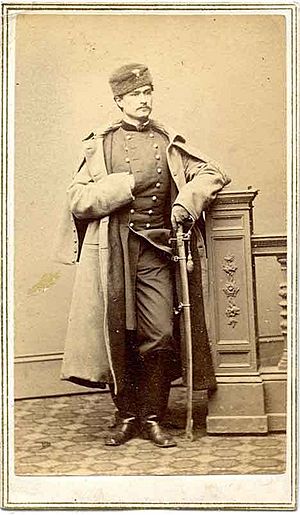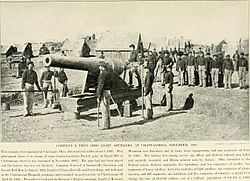Hubert Dilger facts for kids
Quick facts for kids
Hubert Anton Casimir Dilger
|
|
|---|---|
 |
|
| Born | March 5, 1836 Engen, Germany |
| Died | May 4, 1911 (aged 75) Front Royal, Virginia, U.S. |
| Place of burial |
Rock Creek Cemetery, Washington, DC
|
| Allegiance | United States of America Union |
| Service/ |
United States Army Union Army Illinois National Guard |
| Years of service | 1861 – 1865 (Army), 1869 – 1873 (National Guard) |
| Rank | |
| Unit | |
| Commands held | Battery I, 1st Ohio Light Artillery |
| Battles/wars | American Civil War |
| Awards | Medal of Honor |
Hubert Anton Casimir Dilger (born March 5, 1836 – died May 4, 1911) was a German-American soldier. He became a highly praised cannon expert in the Union Army during the American Civil War. People knew him as one of the best artillery officers in the Army of the Potomac. He earned the Medal of Honor for his brave actions at the 1863 Battle of Chancellorsville.
Contents
Early Life and Military Training
Hubert Dilger was born in Engen, a town in the Black Forest region of Germany. He studied at the Karlsruhe Military Academy. This was a special school for soldiers.
After his training, he became a lieutenant in the Grand Duke's Horse Artillery. He served at military bases in Gottesau, Karlsruhe, and Rastatt. Dilger came up with many new ideas about how to use cannons and train soldiers.
Serving in the American Civil War
When the American Civil War started, Dilger got permission to leave his German army post. He then sailed to the United States.
He moved to Cincinnati, Ohio. There, he became the captain of Battery I, 1st Ohio Light Artillery. This was a unit that used cannons. He fought in many battles with the Army of the Potomac. One of these was the Second Battle of Bull Run. He served under Major General Carl Schurz, who was also from Germany.
On May 2, 1863, Dilger showed great bravery at the Battle of Chancellorsville. He helped protect the retreating Union XI Corps. This battle was very difficult for the Union side. Dilger set up his six powerful cannons, called 12-pounder Napoleon smoothbore cannons. He used them as a final defense against a huge part of Stonewall Jackson's army. Jackson's troops had pushed back the Union XI Corps and were close to defeating the Union line. For his actions that day, Dilger received the nation's highest award, the Medal of Honor, in 1893.
Dilger also received high praise for his work at the Battle of Gettysburg. He was also recognized for his efforts in the 1864 Atlanta Campaign. During this campaign, his cannon unit fired the shots that killed Lt. General Leonidas Polk. Later in the war, he was assigned to guard duty.
Life After the War
After the war ended, Hubert Dilger did well in Ohio. He later bought a large horse farm in the Shenandoah Valley. This farm was near Front Royal, Virginia. He lived there and raised his family. After he passed away, the U.S. Army bought part of his farm. They used it to create a horse supply center called the Front Royal Remount Quartermaster Depot.
Family Connections
Hubert Dilger's son, Anton Dilger, was involved in a controversial event during World War I. He worked for Germany and tried to infect horses in the still-neutral United States with diseases like anthrax and glanders.
Hubert Dilger was also the grandfather of General der Kavallerie Carl-Erik Koehler and Generalmajor Hubertus Lamey. Both of them served in the German army during World War II. Another grandson, Captain Carl Anton Keyser, served in the U.S. Navy during World War II. He was an officer on the USS Eberle (DD-430).
Hubert Dilger is buried at Rock Creek Cemetery in Washington, DC.
 | Bessie Coleman |
 | Spann Watson |
 | Jill E. Brown |
 | Sherman W. White |


